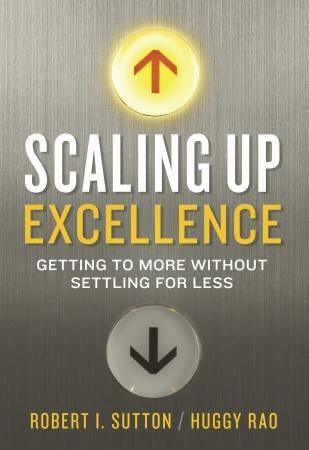How Do You "Scale Up" Excellence?
Scaling Up Excellence: Getting To More Without Settling for Less, written by Robert Sutton (@work_matters) and Huggy Rao (@huggyrao) is an important read for leaders. Whether you are a building leader such as a principal or assistant principal, team leader, department leader, or the superintendent acting as the head of the organization, you can glean important insights from the ideas and research shared by Sutton and Rao in this book.
I first read the work of Robert Sutton when I was working as a principal. I enjoyed and recommend Good Boss, Bad Boss (and this other book he wrote) immensely. I know most leadership books are published for those working in the business sector, however I always find key take-aways from Sutton’s work that help influence my role in educational leadership.
Sutton and Rao describe the scaling mantras and strategies leaders can use to spread greatness by presenting vignettes from corporations and organizations who have done just that. They’ve summarized their findings into seven "scaling mantras." Consider:
1. Spread a mindset, not just a footprint.
- Influence how your people think, act, feel, and filter information; believe in and live a shared mindset for success; requires constant vigilance
2. Engage all the senses.
- Sights, smells, temperature, touch, visuals, and surroundings influence perceptions and mindsets. Pay attention to these cues.
3. Link short-term realities to long-term dreams.
- Achieve short-term goals, and do it well, all without losing sight of future goals. Link the present to what you hope to achieve in the future.
4. Accelerate accountability.
- Accountability means “that an organization is packed with people who embody and protect excellence (even when they are tired, overburdened, and distracted), who work vigorously to spread it to others, and who spot, critique, and (when necessary) push aside colleagues who fail to live and spread it." (p. 20)
- How many of us can say we expect our staff to embody accountability in this way?
5. Fear the clusterfug.
- Illusion, Impatience, Incompetence. "This trifecta causes scaling efforts to fail big and late rather than early and cheaply." (p. 25)
6. Scaling requires both addition and subtraction.
- Leaders must recognize that the things that were successful in the past may need to be eliminated in order for excellence to spread. Strategic subtraction is necessary.
7. Slow down to scale faster- and better - down the road.
- Organizations must learn how and when to shift gears in thinking. They must thoughtfully consider what they’re doing and why.
"Scaling excellence requires the kind of grit required to run a marathon rather than a sprint." (p. 32).
How to connect people, how to deal with the complexities of leadership, how to nurture your people so they “own the place," how to build upon former successes and learn from failures… these are just some of the issues explored and detailed in this book.
I appreciate that the authors acknowledge the struggle of it all. Becoming great is an exhausting, infuriating, overwhelming, exhilarating, and ultimately, rewarding process. But getting there- that’s no easy feat. Especially for those of us who work in public education, with increased mandates and less funding and more rigidity and less autonomy, it’s easy to give up the fight before even finding the energy to engage.
The battle to greatness is worth it- it’s for our kids. They deserve not pockets of greatness here or there, but phenomenal efforts, achievements, and care everywhere.

comments powered by Disqus